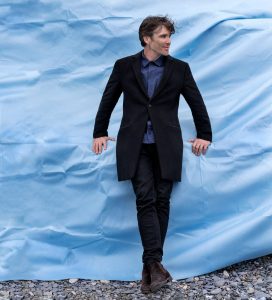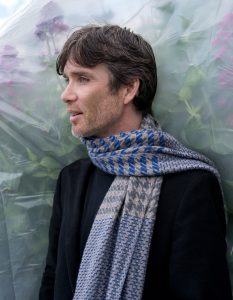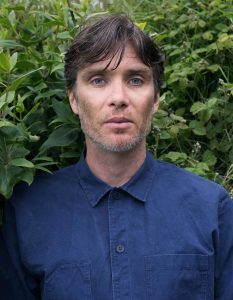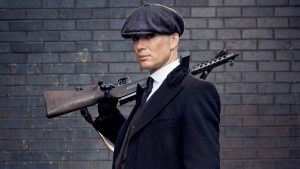
Cillian Murphy wants to go for a hike. He’s got a favorite spot, a hulking Game of Thrones sort of hill on the Irish coast, not far from where he lives with his wife and sons and a Labrador named Scout. I’m a few minutes early to the trailhead, and already the day has taken on a strange cast. An abandoned hotel sits eerily near the bottom of the hill, its few non-smashed windows boarded up. A missing-person flyer flaps on a telephone pole. The clouds come in low. I chuckle: It’s as if I’ve found myself on the set of the kind of movie a young Murphy would have haunted with his distinct mix of calm and menace.
Murphy, 43, is a throwback of an actor. In an era defined by stars broadcasting their real selves on social media, he’s carefully remained opaque. He’s not on Instagram, or Twitter. He doesn’t take photos with fans, instead asking if he can shake their hands, or have a chat, or sign something. He doesn’t want to be famous, and in fact he actively rejects the idea that he ought to be.
Consequently, the public understanding of Murphy holds that, because he is usually a little spooky onscreen, and we almost never see him off-screen, Cillian Murphy must be kind of a creepy guy.
But here he comes, springing along the promenade with a smile, waving genially, carrying his tote bag. He actually calls out, “Hello!” The day seems to brighten.
Murphy, who was born in Ireland, moved back a few years ago, after some 15 years in London. He gestures toward the inn and tells me that he’s been on plenty of shoots there. “It was famously disgusting,” he says. “They would rent it out to film crews because you didn’t have to do any design.” We set off along a muddied path, and the scenery changes almost instantaneously: a mountain of green on our right, the wind-whipped Irish Sea to our left. The hotel is in our rearview, and we have been deposited somewhere in the ninth century.
 Murphy is compact, with a sort of coiled athleticism to him. We’re both wearing Blundstone boots, but only his, righteously thrashed, look like a pair that someone regularly hikes in. And he does: For about six months of the year, he’s happy to hike, walk the dog, and make pasta for his kids. During the other six, he tends to a career that’s headed in an ever more fascinating direction. He spent the back half of 2018 on location in Manchester, filming the fifth season of the adored Peaky Blinders.
Murphy is compact, with a sort of coiled athleticism to him. We’re both wearing Blundstone boots, but only his, righteously thrashed, look like a pair that someone regularly hikes in. And he does: For about six months of the year, he’s happy to hike, walk the dog, and make pasta for his kids. During the other six, he tends to a career that’s headed in an ever more fascinating direction. He spent the back half of 2018 on location in Manchester, filming the fifth season of the adored Peaky Blinders.
The BBC series, which streams on Netflix, features Murphy—as the early-20th-century gangster Tommy Shelby—in practically every scene and consumes an increasingly large share of his off-camera attention now that he’s a producer. Still, he finds time for narrower creative pursuits—theatrical work whenever he can, like the alarmingly intense stage show Grief Is the Thing With Feathers, which ran in London and Brooklyn this past spring. A few weeks after our hike, he’ll head to upstate New York to shoot the sequel to A Quiet Place, about which he’ll say nothing.
The diversity of projects—a big Hollywood production here, a blink-and-you’ll-miss-it theatrical run there—is nothing new for Murphy, who has rigorously assembled a creative career on his own admirable terms. One consequence of those choices is that Murphy’s career has been spent further from the white-hot center of show business than his talent would suggest; he’s remained purposefully guarded from the notoriety that he finds antithetical to creative success (much less personal happiness). Of course, Peaky Blinders has mostly changed all that. As the show’s popularity grows, Murphy has earned a vehicle that displays the full breadth of his gifts—and a level of fame that he finds completely mortifying.
“I thought it was a terrible title,” Murphy says, laughing about the name of the show through which he’s become uncomfortably well-known. For those unfamiliar with the show, its moniker is drawn from the vicious Birmingham gang that Murphy’s Shelby leads. They call themselves the Peaky Blinders, in recognition of the razor blades they sew into the brims of their peaked caps. Trust me: It makes more sense in context, that context being the brutal (and ever-so-slightly fictionalized) England of the interwar years.
The show has an impressive following in the U.S., but in the U.K. it is a phenomenon—one that rides largely on Murphy’s performance. “Tommy Shelby is not only the main character,” his co-star Helen McCrory says. “So much of Peaky Blinders is Tommy’s interior landscape and his thought process.” It has made Murphy something he’s spent two decades trying very hard not to be: a star. “I never wanted to see my name over a title of a movie,” he says as we amble along the trail. “None of that shit ever entered my thinking, ever.”
There have been moments in his career when it seemed as if he might be able to lash art and commerce together. Years back, he explains, he had a great meeting with Christopher Nolan, who’d been handed the Batman franchise and was preparing for 2005’s Batman Begins. Nolan had spotted Murphy in Danny Boyle’s surprise hit 28 Days Later, a 2002 zombie thriller that sparked a good deal of curiosity about the young Irish actor. He visited L.A. for a round of talks. “I quite like the transparency of Hollywood and the studio system,” he says now, a little acidly. “When you’re in a film that makes a lot of money, people will take a meeting. That’s exactly what happened. I went out to Los Angeles and I got an American agent and I had meetings with people. They attempted to pronounce my name. I was probably far too cynical for my own good.” (For the record, it’s kill-ee-an.)
The vibe was different with Nolan, who suggested that Murphy test for the role of Batman. Murphy wasn’t exactly eager for global superstardom, but he acquiesced: “My thing was, like, ‘Listen, if I even get to just screen-test for Chris Nolan, that will be enough for me.’”
So it was that Murphy found himself one day on the Warner Bros. lot in Burbank, struggling to fill an oversize Batsuit. “It was far too roomy for me,” he recalls. “And I knew that Christian Bale was testing, and I was like, ‘Obviously, he should play Batman. Why am I even here?’ But it was fun. It’s a great thing to tell your kids. And then something came out of it.”
That something was a part in the film as Dr. Jonathan Crane, or the Scarecrow: a psychologist who wears a burlap sack over his head while spraying his victims with fear gas. Earning the villain gig helped Murphy plot a route forward. “I think at the beginning, I may have been too dismissive of it,” he says of a big Hollywood blockbuster.
“When I eventually got to meet someone like Christopher Nolan, you go, ‘Right, that’s how you do it.’ ”
The movie helped change Murphy’s trajectory. Hollywood casting directors began sending him creepy-villain parts to read, but more importantly, the film gave Murphy a unique toehold in Hollywood: the rare chance to do interesting work on his terms. If you’re cast as the hero, he realized, you’re likely signing up to do a bunch of films, smiling blandly and playing the same character. If you play the villain, you get to have fun with a kicky part—and even if you do reprise the role, as Murphy did in both Batman sequels, you’re still working with Christopher Nolan. Between roles in artier films, Murphy signed up for Nolan’s Inception and Dunkirk, too.

“Cillian Murphy is one of the great actors of his generation both on stage and on film and working with him repeatedly over the years has been an increasingly rewarding experience,” Nolan wrote in an email from the set of his new film, in Estonia.
A gospel was taking shape in his head: Collaborate with talented partners. Keep 5,000 miles between yourself and Los Angeles. Be ruthless in the work you commit to. Do theater—the more difficult the better. And, for fuck’s sake, don’t get famous.
Cork, 1994. Maybe, 1995. Cillian Murphy’s rather unlikely journey to becoming, as Nolan says, one of the world’s great actors begins on a stage. He isn’t yet 20. Raised by teacher parents, he’s playing in an acid-jazz band with his brother and stumbling his way toward a law degree that he has no interest in.
He’s hanging around the theater company of the playwright Enda Walsh, who is trying to cast Disco Pigs, one of his first plays, about the tragic misadventures of a pair of Irish teens. Walsh agrees to meet Murphy. “I think he was 18, 19, but he looked about 13,” Walsh tells me. “And he had this incredible energy and an aura to him.”
Walsh gave Murphy the part, and things promptly went supernova. The show opened in Cork, toured the world for the next two years, and spawned a film adaptation. Murphy’s young enough to think this is just how it goes. “To fucking walk into a part like that without any training or experience, and then for it to be a massive success, was unbelievably jammy,” meaning lucky, he says now. Jam begot jam: He wandered into the lead when Boyle was casting his zombie film—and 28 Days Later promptly mauled the box office.
At this point, another actor—most other actors—might have trampolined into spandex franchise work, leading-man stuff, big-budget productions. You screen-test as Batman, and the rest solves itself.
But Murphy took his time, went back to the theater, started working with Nolan. He got married, had kids, seized only the opportunities that moved him. “My favorite actors have always been the ones where you go, ‘Is that the same guy?’ ” he says. If choosing parts that would lead audiences to ask that question also meant they wouldn’t recognize him off-screen, he figured, even better.
We’re done with the hike now, sitting at a nearby café and talking about his decision to take the role on Peaky Blinders, in 2013. At first, Murphy says, the show’s producers had a tough time imagining him in the part: “I had never really done that war veteran, physically intimidating, physically capable, reasonably fucking hench dude. So, I had to convince them that that’s just part of the gig.” Steven Knight, the show’s creator, was thrilled to hear that Murphy was interested. Whatever misgivings he might have had were erased when Murphy texted with a reminder that transformation was kind of his specialty. “‘Remember: I’m an actor,’” Knight recalls it reading.
Some of the joy in watching Peaky comes from the details: the high-and-tight haircuts, the brutally tailored suits, the anachronistic music (Nick Cave, PJ Harvey) and score that Netflix’s closed-captioning characterizes as “boogie.” The rest of the thrill, however, comes from Murphy, who brings his distinct gravity to a black-and-blue genre piece.
Television antiheroes are a dime a dozen, but in Murphy’s hands, Tommy Shelby—while obviously indebted to the Tony Sopranos and Walter Whites of the world—feels weighty, three-dimensional.
From one angle, Peaky Blinders is pure pulp—slow-motion slashing of eyes, boxing matches, riotous nights of drinking. From another, it is no less a drama of respectability than something like Downton Abbey. The role requires Murphy to look cool and sexy and menacing and, most crucially, to do all that while making it clear to the audience that he is plotting five and six chess moves ahead. It is a star’s role: The camera is happy to linger on Murphy’s face, which is arranged such that direct light hits his very high cheekbones, casting everything beyond and beneath them into shadow, so steep is their downward slope. “He’s extraordinarily striking-looking onscreen,” says Helen McCrory, who plays Polly, Tommy’s aunt and his scheme-drafting equal. “You look at the shots of him and you think, ‘My God, it’s so beautifully lit,’ and they go, ‘No, we haven’t started lighting yet.’ That’s just Cillian. He brings his own light.”
The next night we meet in the village of Dalkey, notable for the two 14th-century castles plopped on either side of its hilariously quaint main street. “It just looks like a fairy tale, you know?” Murphy says. He took the train here. There’s a restaurant he likes, but first we stop at a pub.
 Murphy orders us two Guinness, and the young bartender’s eyes well pop out of his head when he recognizes who has asked for them. The kid contains his excitement until we’re on our way out, at which point he asks for a photo. Murphy counters with a signature. The guy comes back with a pen and a piece of paper. Murphy asks his name; when the kid says Conor, Murphy asks, “C-O-N-O-R?” A night is made, and we’re off to dinner.
Murphy orders us two Guinness, and the young bartender’s eyes well pop out of his head when he recognizes who has asked for them. The kid contains his excitement until we’re on our way out, at which point he asks for a photo. Murphy counters with a signature. The guy comes back with a pen and a piece of paper. Murphy asks his name; when the kid says Conor, Murphy asks, “C-O-N-O-R?” A night is made, and we’re off to dinner.
As Murphy greets the hostess and we take our seats, I become acutely aware that it is me, rather than the famous actor, who is the strange thing in this scene. He seems at home here, so I ask how he balances that with his desire to do interesting work, which means spending half the year in strange places with strange people. “That work-life-balance thing is hard,” he concedes. “I have an amazing wife”— the Irish artist Yvonne McGuinness — “and I couldn’t do this without her and her understanding. But it is a struggle. I think it is for any dad whose work takes him away, which it generally does, and which consumes him, which my work does.”
He’s developed strategies to deal with encroaching fame and to keep life normal. “I make sure that I try not to go from job to job to job, because that means you live in a bubble of set, hotel, set, hotel, plane, film festivals—which, to me, is not reality,” he says. “So I just check out from that for six months a year.”
We order another round of Guinness (“I would object that that head is slightly larger than I would like,” he says when they arrive. “We call that a bishop’s collar in Ireland, because it’s too big”) and then dinner. Talk turns to legacy. “I figured this out,” he says. “I started [Peaky] when I was 35, nearly 36. By the time I finish, I’ll be 45. So I’ve given a whole decade of my life to the BBC.”
It’s opened new lanes for him, and he’s thankful. He took his kids to see A Quiet Place, and they loved it. He had drafted a complimentary email to director John Krasinski to let him know how much he’d enjoyed the film before deleting it, too embarrassed to hit “send.” And then Krasinski called him up out of the blue to offer him a lead in the sequel.
There is also, of course, the matter of Bond. Murphy has long been rumored to be in the running to replace Daniel Craig. A few weeks before we meet—and a month after Murphy’s odds to win the role are slashed to 10–3 (this is something you can bet on in the U.K.)—Bond creator Ian Fleming’s great-niece tells a British publication that Murphy would make a great 007. “It seems to be a way of generating business for bookies,” Murphy says, amused. “So, someone who happens to be in a TV show and wears a tux occasionally in a TV show…,” he trails off. “But having said all of that, it’s incredibly flattering to be in that conversation.” And then, a beat later: “I think it should be a woman.” He’s heard that Phoebe Waller-Bridge is doing a rewrite on the forthcoming Bond film’s screenplay—he loved the new season of Fleabag. “She is a genius. An absolute, stone-cold genius.”
And that’s that. It might make news, might move the betting markets again, might well take him out of contention for the part entirely. He won’t care—he doesn’t read the trades, has no use for industry gossip. He finds that aspect of the job—not the work but all of the space junk that floats around it—just an utter nightmare. He seems modest to the point of abstemious, so I ask if there’s anything he splurges on. He doesn’t want to get into it, in the process opening up a different can of self-loathing. “I’m really lucky. I feel embarrassed by it sometimes. I’m just a fucking actor. There are doctors and nurses and fucking people that work in… I struggle with that. I mean, actors are overpaid, you know? It’s nice when you get paid, when you’re young, and you’ve gone from having no money, but the Catholic guilt kicks in immediately, and I’m like”—here his voice jumps up into a reedy, wheedling register—“It’s all going to go wrong. You don’t deserve this. And I don’t,” he says matter-of-factly.
Ultimately, he’s worked out a calculus that renders it all legible enough. “They’re buying your anonymity, right? They buy that, and you get put on posters, and you get all of that stuff,” he says. But everything else—life at home, his guitars, the house, whatever—that’s not for public consumption.
I suggest he might not need to beat himself up for succeeding in such a capricious line of work. “No, I know,” he says. “But listen.” He slows down, choosing his words carefully and delivering them forcefully. “I just want to be decent and kind. They’re old-fashioned values, but they seem to be disappearing nowadays. Nowadays it’s normal to be a bully, to be a misogynist, to be a creep. Those points of view are getting validated all over the world. And not to be ostentatious, not to talk about yourself too much. That’s what I’m trying to hang on to. That’s how I was raised. I don’t always succeed. My wife or my children will tell me if I’m failing at that shit, but that’s all I really want to do. And do good work. That’s important.”
 Before we call it a night, he brings up Gene Hackman, who starred, with Al Pacino, in Murphy’s favorite film, 1973’s Scarecrow. It’s clear he thinks of Hackman often—or more specifically, about the way the legend got out of the game. “Never see him, never hear from him, never said, ‘I’m retiring,’” Murphy marvels. “Disappeared, lives in New Mexico. I think he writes novels. That is so elegant, so beautiful. Leave this amazing, extraordinary body of work behind you and just have another life. I admire that tremendously.”
Before we call it a night, he brings up Gene Hackman, who starred, with Al Pacino, in Murphy’s favorite film, 1973’s Scarecrow. It’s clear he thinks of Hackman often—or more specifically, about the way the legend got out of the game. “Never see him, never hear from him, never said, ‘I’m retiring,’” Murphy marvels. “Disappeared, lives in New Mexico. I think he writes novels. That is so elegant, so beautiful. Leave this amazing, extraordinary body of work behind you and just have another life. I admire that tremendously.”
He clarifies that he wouldn’t dream of putting himself into the same class of actor: “I’m just making sure that I’m not comparing myself to fucking Gene Hackman.” Eventually we’ll head back out into town, where it’s ten o’clock and the sun is finally setting.
Before long, Murphy will stroll back up to the train station and he’ll pace along the platform while he waits. When his train arrives, he’ll ride for a few stops. He won’t go full Gene Hackman tonight. Not yet. Instead, when the train doors open, he’ll step out into the misty suburban evening. In a few minutes, he’ll be home.




















Leave a Comment